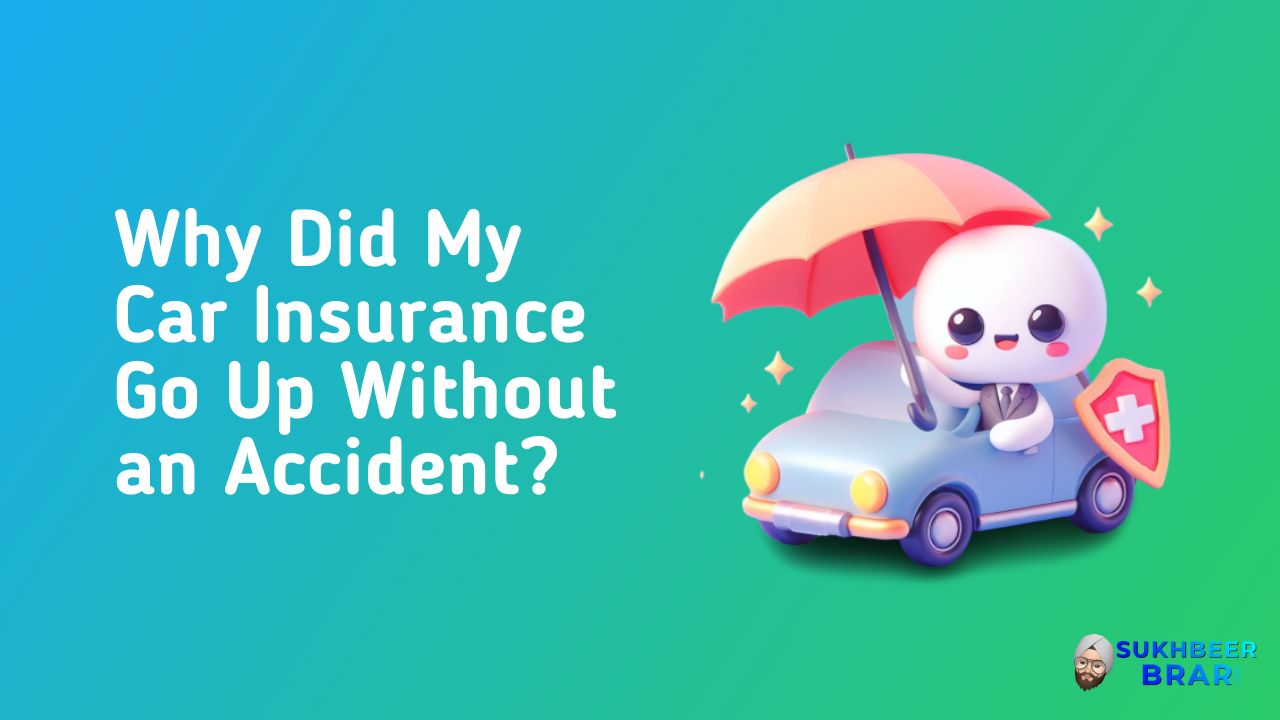Finding out your car insurance rate went up can be confusing and frustrating, especially if you haven’t been in an accident or received any traffic tickets. You may wonder, “Why is my auto insurance going up if nothing has changed?”
There are actually many factors that affect your car insurance premiums besides accidents – some you may not realize. Insurance companies look at more than just your driving record when calculating your rate. Things like where you live, your credit score, age, marital status and more all impact how much you pay.
So before you get upset at your insurance provider for hiking up your rate, it’s important to understand all the potential reasons. This article explores the top factors that cause your car insurance to increase, even if you have a clean driving history with no claims. We’ll also look at some options on addressing rate hikes through negotiation or finding a better deal.
While it can be annoying to pay more, having the right information can help you make an informed decision on your coverage. Let’s dive in on why you may be paying more for car insurance despite your spotless driving record.
Driving Record Factors
Your driving record, including any accidents, speeding tickets, or other violations can significantly impact your car insurance rates. Insurance companies view drivers with recent accidents, multiple violations, or major violations like DUIs as higher risk. Even minor speeding tickets can increase your rates.
- A single accident where you are at-fault can increase your rates by 10-15% on average. Multiple accidents in a short period can increase rates by 25% or more.
- Speeding tickets for going 1-15 mph over the limit typically increase rates 5-10%. Going 15+ mph over can increase rates 10-25% or more.
- DUIs can increase rates by 80% on average due to being considered high-risk.
- At-fault accidents, speeding tickets, and violations stay on your record for 3-5 years depending on the state and insurance company. More recent incidents have the biggest impact.
- Being ticket-free and accident-free for 3-5+ years can help lower your rates again over time.
- Taking defensive driving courses after a violation can sometimes prevent increases or lower your rates.
The bottom line is that maintaining a clean driving record over a long period is key to keeping rates low. But even a single violation can negatively impact your rates for years. It’s important to drive safely and maintain your record to avoid increases.
Policy and Personal Factors
Changes to your policy or personal details can impact your insurance rates. Here are some common reasons your rates may increase due to policy and personal factors:
Coverage Changes
- Increasing your liability limits: Raising your liability coverage from state minimums to 100/300/100 or higher will increase your premiums. More liability coverage means the insurer takes on more risk.
- Adding comprehensive or collision coverage: If you previously had liability-only insurance and added comprehensive or collision, your rates will go up to account for the additional coverage.
- Reducing or removing discounts: Discounts like multi-policy, safe driver, and others can reduce your premiums. If any discounts are reduced or eliminated, your rate will increase.
Personal Information Updates
- Changes in marital status: Getting married can lower rates due to more driving experience. Getting divorced can increase rates. Insurers view divorce as a disruption that may lead to more claims.
- Adding teen or young drivers: Teen and young drivers under 25 are viewed as higher risk, so adding them will increase your premiums significantly. Some marry young drivers to their own policy to save money.
- Moving to higher risk area: Moving from a rural to urban area or a place with more accidents, thefts and claims can increase your rates. Your new location is seen as higher risk.
- Lapses in coverage: Gaps between insurance policies or cancellations can trigger rate increases later on. Continuous coverage is best to maintain lower rates.
Location and Vehicle
Where you live and the type of vehicle you drive can significantly impact your car insurance rates. Insurance companies assess risk based on these factors:
Zip Code
Your zip code is one of the main criteria used to determine your rates. Areas with higher incidents of accidents, theft and vandalism will have higher premiums. Urban areas also tend to have more expensive coverage.
Vehicle Type
Some vehicles are more expensive to insure than others. Sports cars, luxury vehicles and SUVs typically have higher insurance rates because of their value and repair costs. Family sedans and economy cars usually have lower premiums.
Vehicle Age
Brand new cars cost more to insure because of their higher value. As a car gets older, it depreciates and generally costs less to insure. But once a vehicle becomes too old, maintenance issues can increase premiums.
Vehicle Value
The higher the value of your car, the more it costs to insure because repairs and replacements are more expensive. Older, used cars with lower values have cheaper premiums.
So if you move to a pricier location or purchase a new luxury SUV, you can expect your rates to increase, even without any accidents on your record. Insurance companies regularly reassess these risk factors to adjust premiums accordingly.
Industry and Economic Trends
Insurance rates are heavily influenced by broader economic and industry factors that are outside of a policyholder’s control. As the costs incurred by insurance companies rise, this gets passed along to customers in the form of higher premiums.
Some of the key economic and industry trends that can impact car insurance rates include:
- Insurance costs – The costs for insurance companies to pay out claims, cover overhead expenses, and remain profitable continue to rise over time. More frequent and expensive claims lead directly to rate increases.
- Inflation – As the costs of goods, services, repairs, medical care, and wages rise with inflation, insurance rates rise correspondingly. Things simply cost more over time.
- Vehicle repair costs – Repairing today’s high-tech cars with sensors, cameras, and expensive materials is far more costly than simpler vehicles of the past. This flows into insurance pricing.
- Medical care costs – Medical costs consistently outpace general inflation, meaning injury claims become more expensive for insurers. Rates increase to compensate.
- Cost of disasters – Catastrophic events like major hailstorms, flooding, tornado outbreaks and hurricanes take a financial toll on insurance companies when concentrated in a region. This can prompt localized rate hikes.
- Lawsuits and legal claims – Growth in lawsuits against insurance companies and larger court awards also raise insurer costs. Some states cap awards while others have unlimited potential liability.
- Distracted driving – Rising distracted driving rates leading to more accidents and claims directly raise insurance costs. Companies cite this trend when raising rates.
So while an individual’s driving record is important, larger economic forces related to the inherent costs of providing insurance drive up rates as well. Policyholders may feel powerless against these broader industry trends, but being aware of them provides helpful context.
Credit and Marital Status
Your credit score and marital status can impact your car insurance rates. Insurance companies view these as indicators of risk and responsibility.
Credit Score
In most states, insurers are allowed to use your credit-based insurance score when determining your rates. This score is calculated based on information in your credit report and factors such as payment history, amounts owed, credit history length, new credit, and credit mix.
Generally, people with poor credit scores are seen as higher risk and tend to get charged higher premiums. Those with excellent credit tend to get lower rates. However, even a minor dip in your credit score could potentially cause an increase in your car insurance costs.
Some ways to maintain a good credit score include:
- Pay all bills on time
- Keep credit card balances low
- Limit credit inquiries and new accounts
- Correct any errors on your credit report
Monitoring your credit and taking steps to improve it can help minimize rate hikes.
Marital Status
Insurers have found statistical correlations between marital status and claim risk. Specifically, single policyholders tend to have higher loss ratios compared to married couples.
As a result, being single can contribute to paying higher car insurance premiums than married couples. Some reasons cited for this discrepancy include:
- Single people tend to take more risks while driving
- Married couples drive more cautiously to protect their family
- More financial responsibilities may cause singles to file smaller claims
However, being single doesn’t guarantee higher rates. Your overall risk profile, driving history, and other factors also weigh in. If you feel you are being unfairly overcharged due to your marital status, discuss this with your insurance provider.
Unusual Situations Leading to Rate Increases
Some less common situations can also cause your car insurance rates to rise. Insurance companies may see gaps in coverage, fraud indicators, or other unusual activity as increasing risk.
Gaps in Coverage
If you had a lapse in auto insurance coverage, even for legitimate reasons, insurers may view this as higher risk. Some states even legally allow insurers to increase your rates if you went without continuous insurance coverage.
Gaps raise concerns that you may have had an accident or claim that was not reported. Or you may have chosen to drop coverage due to higher risk driving. Insurers tend to prefer customers with stable, long-term coverage.
Fraud Indicators
Insurance companies are always on the lookout for signs of fraud. If something seems suspicious in your application, claims history, or other interactions, they may increase rates or even deny coverage.
For example, if you report a stolen vehicle but the details seem questionable, this could flag you as higher risk. Or if your address history doesn’t seem to match up, they may suspect fraud.
Even unintentionally misleading information can sometimes get flagged during insurance company audits and reviews. Higher premiums may result as they perceive greater risk.
Being vigilant about providing accurate, timely information can help avoid such scenarios. But increased rates unfortunately may happen even if the flags resulted from innocent mistakes or misunderstandings.
Negotiating Rates
When your car insurance rates go up, you may be able to negotiate with your insurance company to get a better rate. Here are some tips for negotiating your car insurance rates:
- Review your policy in detail. Go through your policy line-by-line to make sure you understand what coverage you have. See if there’s any coverage you can do without or lower. Removing certain coverages like rental reimbursement or roadside assistance can lower your rates.
- Ask about discounts. Insurers offer various discounts – good driver, good student, multi-policy, etc. Ask your insurer if you qualify for any discounts that are not currently on your policy. This could save you money.
- Compare rates from other insurers. Get quotes from a few other top insurers. Present these competitor rates to your insurer and ask them to match or beat the pricing. Having quotes in hand gives you leverage when negotiating rates.
- Raise your deductible. Opting for a higher deductible is one of the easiest ways to lower your rates. Going from a $500 to $1000 deductible can result in significant savings. Just make sure you have funds to cover the higher deductible if needed.
- Improve your credit. Insurance companies view customers with poor credit as riskier and charge them higher rates. Improving your credit score can help you earn lower premiums over time.
- Ask about discounts for safety features. Adding safety features like airbags or anti-theft devices can qualify you for discounts with some insurers.
- Inquire about multi-policy discounts. You may save by bundling home and auto insurance with the same provider.
By proactively reviewing your policy and comparing rates, you can potentially negotiate much better pricing on your car insurance.
Read Also: Where Can I Find The Cheapest Auto Insurance?
Alternatives
When faced with an increase in car insurance rates, there are some alternatives to consider that may help lower your premiums.
Higher Deductibles
One way to potentially decrease your rates is to opt for a higher deductible. This means that you agree to pay more out-of-pocket in the event of a claim before the insurance coverage kicks in. While this carries some additional risk, choosing a deductible of $500, $1,000 or even $2,500 can lower your premiums substantially. Just be sure you have enough in savings to cover the higher deductible amount if needed.
Usage-Based Insurance
Another option is usage-based insurance, sometimes called pay-per-mile insurance. With this type of policy, your premium is calculated partially on how much you actually drive during the policy term. This can benefit some drivers who don’t rack up high mileage and allows you to have more control over your insurance costs. These programs involve installing a small device in your vehicle to track mileage. While privacy concerns exist, usage-based insurance can be a viable alternative to look into if you want your premium directly tied to your driving habits.
By weighing choices like higher deductibles or usage-based insurance, you may be able to offset some of the sting from a rate increase and keep your insurance more affordable. Carefully evaluating all of your options is key when policy renewal brings higher premiums.
Conclusion
In summary, there are several potential reasons why your car insurance may have increased, even without an accident on record. The main factors include:
- Changes in your driving record, such as new tickets or violations. Insurance companies review driving records regularly and will adjust rates accordingly. Even minor tickets can sometimes trigger increases.
- Changes in your policy, such as reduced deductibles or new coverages added. Adding more robust coverage options will increase your premiums. Also, changes in personal details like your address, mileage, or marital status can affect rates.
- Your location and insurance scoring factors determined by your vehicle, age, credit score, and other data points used by insurance companies to gauge risk levels. These can influence your premiums upward.
- Broader industry trends, economic conditions, and the individual insurance company’s financial situation. Insurance rates fluctuate based on complex statistical models and projections.
- Unusual situations like frequent claims or suspicious activity may also trigger increases.
The main takeaways are to review your policy carefully, research competitive rates regularly, drive safely, and negotiate firmly but fairly if your rates increase unexpectedly. Being an educated consumer is key to getting the best value car insurance.



